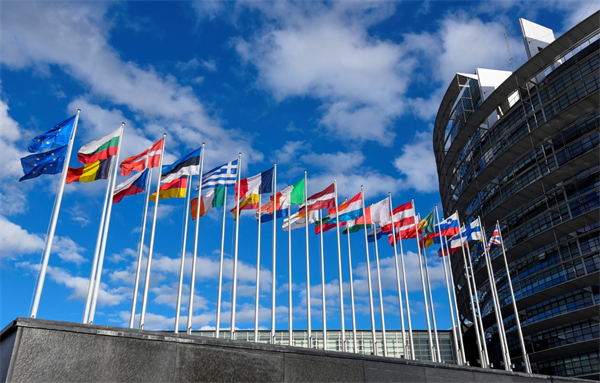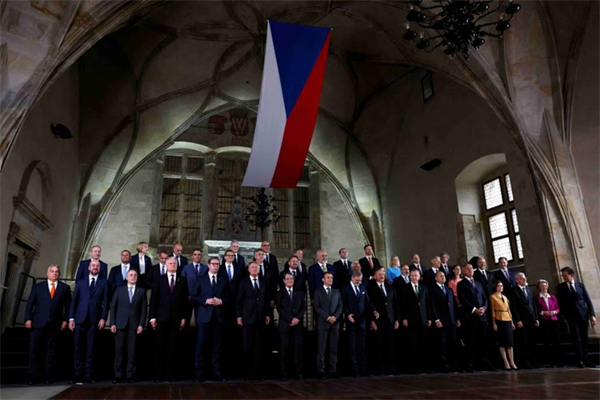The CCCEU Weekly Update 06 October 2022: Brussels approves new sanctions against Russia

Brussels approves new sanctions against Russia
Editor's Note: The EU was quick to approve a new round of sanctions against Russia on Thursday, providing a legal basis for a price cap on Russian oil. On Monday, the bloc's securities watchdog recognised Shanghai Clearing House, a move set to boost China-EU financial cooperation. In the EU bubble, several events will talk about China next week. This issue of the CCCEU Weekly Update will keep you up to date on China-EU dynamics. Enjoy reading and have a lovely weekend.
New Round of Sanctions
The Council of the EU on Thursday adopted the eighth package of sanctions against Russia, a move aimed at curbing 7-billion-euro revenues for Moscow, further isolating the Russian economy, and weakening the country's military and security might.
The approved package provides a legal basis for the EU to impose a price cap on Russian oil, prohibiting providing maritime transport and relevant services if Russian crude oil or petroleum products are purchased at a higher price than a pre-established cap.
The price cap will drastically reduce the revenues Russia earns from oil and also serve to stabilise global energy prices, the council said in a press release.
The EU is extending the import ban on steel products that either originate in Russia or are exported from Russia. Further restrictions are also imposed on wood pulp and paper, cigarettes, plastics and cosmetics, as well as elements used in the jewellery industry, such as stones and precious metals, that altogether generate significant revenues for Russia, the statement said.
The sanctions also target individuals and entities enabling the referendums that resulted in Moscow claiming the four regions of Donetsk, Lugansk, Kherson and Zaporizhzhia as Russia's sovereign territory. Moreover, the bloc is working to impose punitive measures on those who facilitate the circumvention of EU sanctions.
The package also extends the list of restricted items which may contribute to Russia's military and technological enhancement or the development of its defence and security sector, adding certain electronic components and additional chemicals, said the statement.
EU nationals will be banned from holding "any posts on the governing bodies of certain Russian state-owned or controlled legal persons, entities or bodies," it noted.
The Russian Maritime Shipping Register, in Thursday's package, was newly added to the EU's list of Russian state-owned entities that are subject to the transaction ban.
What is more, it is fully banned to provide crypto-asset wallet, account or custody services to Russian persons and residents, regardless of the total value of those crypto-assets.
In the service sector, architectural and engineering services, IT consultancy services and legal advisory services are prohibited from being provided to Russia.
Brussels to discuss Beijing-proposed dialogue on export control
According to the Council of the EU, the Dual Use Goods Working Party will hold a discussion in Brussels on Oct. 12, with discussing a China-proposed dialogue on export controls on the agenda.
In addition, the discussion will cover the EU's 8th package of sanctions against Russia; the progress of the EU-US TTC export control working group, including trade facilitation; risk assessment for emerging technologies; cybersurveillance technologies; preparations for the 3rd EU-US TTC working group meeting; and a briefing by the US Deputy Assistant Secretary of Commerce on recent US controls.
Talks with new EU ambassador to China
On October 13, MEPs will exchange views with the new EU ambassador to China on the bilateral ties via video link, according to a draft agenda of the European Parliament's Foreign Affairs Committee.
Separately, a one-day conference will be held in the EP on China on the same day.
"European Political Community" VS EU
Paris has a new idea and is pushing for the "European Political Community," or EPC, a bloc larger than the 27-member EU. On Thursday, the community's first ever summit was held in Prague. According to Xinhua, over 40 European leaders were there to inaugurate the new community.
The participants were holding roundtable discussions on security and peace as well as energy, climate and economy in the afternoon. They were also expected to discuss the platform's future settings, including the frequency of meetings and the host countries.

EU recognises Shanghai Clearing House
The European Securities and Markets Authority (ESMA), the EU's securities markets regulator, has updated its list of recognised third-country central counterparties (TC CCPs) to include the Shanghai Clearing House.
The recognition of Shanghai Clearing House as a third-country CCP follows the adoption of a decision on the equivalence of the regulatory framework of the People's Republic of China for central counterparties with EMIR requirements on 22 June 2022, a statement from ESMA said on Monday.
Shanghai Clearing House said in a press release that the EU's recognition would help EU and international organisations engage more efficiently and economically with China's finance sector, deepening their mutually beneficial cooperation.
Green light to DSA
The Council of the EU took an important step on Tuesday to ensure a safer online environment by approving the Digital Services Act (DSA). The DSA protects the digital space against the spread of illegal content and ensures the protection of users' fundamental rights.
Chinese Yuan most traded foreign currency on the Moscow Exchange
The Chinese yuan became the most traded currency on the Moscow Exchange for the first time on Monday, with trading turnover in the yuan-ruble pair reaching 70.3 billion rubles ($1.17 billion), surpassing the 68.2 billion rubles for the dollar-ruble pair, Global Times has the story.
Common charger for mobile devices in EU
EU lawmakers have passed a law that introduces a single charging port for most electronic devices on Tuesday.
According to the new rules, by the end of 2024, all mobile phones, tablets and cameras sold in the EU will have to be equipped with a USB Type-C charging port. From spring 2026, the obligation will extend to laptops.
Under the new regulation, Apple will have to change the charger for its iPhones in the bloc as of autumn 2024.
CCCEU in the media

Xinhua News Agency: Chinese businesses in the EU recorded a rapid growth in 2021 despite the impact of COVID-19 recurrences and supply chain bottlenecks, the China Chamber of Commerce to the EU (CCCEU) said in its annual flagship report. Read more.
Euractiv: According to a survey commissioned by the Chinese Chamber of Commerce to the EU (CCCEU), Chinese companies are concerned about the impact of the EU's directive on corporate sustainability on their business operations and called for a revision of the proposed rules that are partly targeted at tackling human rights abuses in China. Read more.
South China Morning Post: Chinese enterprises operating in the European Union have expressed concern about increasing calls for decoupling and the threat of trade protectionism, with a new report indicating that business sentiment has dropped to a three-year low. Read more.
Table.Media: The Chinese Chamber of Commerce in the EU sees business sentiment at a low. An increasingly complicated political environment, new EU trade tools, and deteriorating public opinion of China are the main factors behind this, said the annual report by the Chinese Chamber of Commerce in Brussels (CCCEU) in collaboration with consultancy Roland Berger. The Chamber of Commerce also expressed concern about calls for decoupling and increasing protectionism. Read more.
What are experts talking about?
"European Economy: Gloomy Prospects for Recovery", written by Sun Yanhong. The article points out that the global energy and food prices remain high, and global economic recovery is weakening due to the impact of the Ukraine crisis and the U.S. and Western sanctions against Russia and the Russian countersanctions. To curb inflation, European countries have tightened their monetary policies and introduced social assistance measures to reduce the impact of inflation on people's livelihoods. However, the monetary tightening policy has increased the risk of the European economy falling into recession, and several institutions have recently lowered their economic growth expectations for the European region. This article discusses the impact of these issues on the European economy.
"The EU economy in crisis: Can we learn from past mistakes?" was published by the European Policy Centre. The author is Philipp Lausberg. The article points out that the economic situation in the EU has deteriorated quickly in the past few months, with a recession becoming more likely. Although comparisons to previous economic crises are easy to find, not all of them hold up. The author believes that the most promising way out of the crisis is to tackle the root cause of the current downturn: high energy prices.
Please note: the English version of this issue is slightly different from our Chinese one. The views and opinions expressed in this article do not necessarily reflect the official position of the CCCEU.

 Login
Login Login
Login CCCEU and Gunnercooke Successfully Host Webinar on CSDDD and FLR Compliance to Guide Chinese Businesses
CCCEU and Gunnercooke Successfully Host Webinar on CSDDD and FLR Compliance to Guide Chinese Businesses Cultivating responsible China-EU business leaders essential to tackling global challenges
Cultivating responsible China-EU business leaders essential to tackling global challenges



